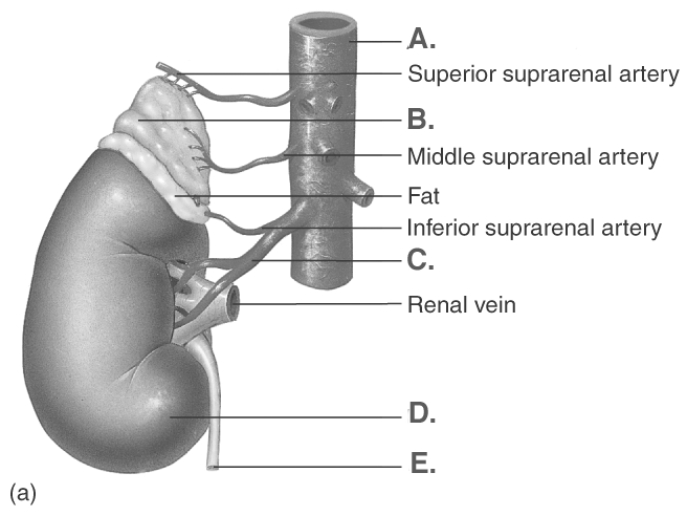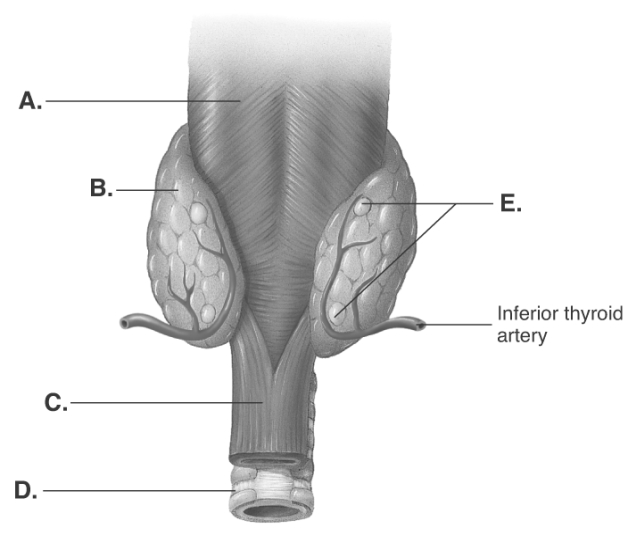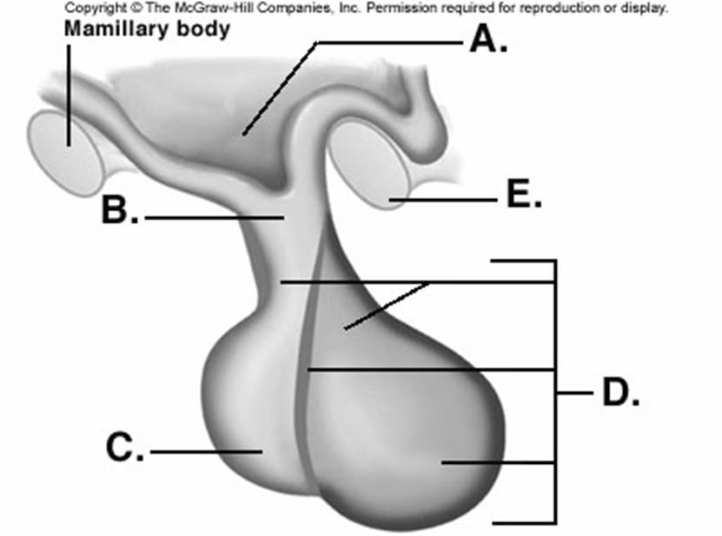A) incidence of bone fractures increases.
B) muscular weakness is common.
C) cardiac arrhythmias occur.
D) constipation becomes a problem.
E) the nervous system becomes depressed.
G) A) and E)
Correct Answer

verified
Correct Answer
verified
Short Answer
 -Based on these laboratory results, which patient is most likely to have the following pathological condition: destructive tumor of anterior pituitary that destroys TSH secreting cells?
-Based on these laboratory results, which patient is most likely to have the following pathological condition: destructive tumor of anterior pituitary that destroys TSH secreting cells?
Correct Answer

verified
Correct Answer
verified
Multiple Choice
 -The figure illustrates the kidney and the adrenal gland. What does "E" represent?
-The figure illustrates the kidney and the adrenal gland. What does "E" represent?
A) kidney
B) ureter
C) abdominal aorta
D) adrenal gland
E) renal artery
G) B) and D)
Correct Answer

verified
Correct Answer
verified
Multiple Choice
Match the pathological condition with its cause. -diabetes insipidus
A) decreased amounts of thyroid hormone
B) increased amounts of thyroid hormone
C) abnormally low levels of aldosterone and cortisol
D) increased levels of growth hormone in adults
E) lack of ADH
G) B) and E)
Correct Answer

verified
Correct Answer
verified
Multiple Choice
Oxytocin is responsible for
A) preventing release of insulin from the pancreas.
B) preventing the formation of goiters.
C) milk production by the mammary glands.
D) regulating blood calcium levels.
E) causing contractions of uterine smooth muscle during labor.
G) A) and E)
Correct Answer

verified
E
Correct Answer
verified
Multiple Choice
 -The figure illustrates the posterior view of the thyroid gland. What does "E" represent?
-The figure illustrates the posterior view of the thyroid gland. What does "E" represent?
A) parathyroid glands
B) thyroid gland
C) pharynx
D) esophagus
E) trachea
G) B) and D)
Correct Answer

verified
Correct Answer
verified
Multiple Choice
 -The figure illustrates the posterior view of the thyroid gland. What does "A" represent?
-The figure illustrates the posterior view of the thyroid gland. What does "A" represent?
A) parathyroid glands
B) thyroid gland
C) pharynx
D) esophagus
E) trachea
G) A) and B)
Correct Answer

verified
Correct Answer
verified
Multiple Choice
Which of the following situations might be the result of hypersecretion of glucocorticoids?
A) weight loss
B) hypoglycemia
C) depression of the immune response
D) increased plasma levels of ACTH
E) proteins and fats are unused
G) B) and C)
Correct Answer

verified
Correct Answer
verified
Multiple Choice
 -The figure illustrates the kidney and the adrenal gland. What does "A" represent?
-The figure illustrates the kidney and the adrenal gland. What does "A" represent?
A) kidney
B) ureter
C) abdominal aorta
D) adrenal gland
E) renal artery
G) A) and E)
Correct Answer

verified
Correct Answer
verified
Multiple Choice
A person with insulin-dependent diabetes mellitus (IDDM) forgets to take their insulin. This causes
A) alkalosis.
B) hypoglycemia.
C) decreased urine production.
D) decreased appetite.
E) hyperglycemia.
G) C) and D)
Correct Answer

verified
Correct Answer
verified
Multiple Choice
The hypothalamohypophysial portal system carries hormones from the
A) anterior pituitary to the hypothalamus.
B) posterior pituitary to the hypothalamus.
C) hypothalamus to the anterior pituitary.
D) hypothalamus to the posterior pituitary.
E) anterior pituitary to posterior pituitary.
G) A) and B)
Correct Answer

verified
Correct Answer
verified
Multiple Choice
Which of the following ions is necessary for thyroid hormone production?
A) potassium
B) calcium
C) iodine
D) sodium
E) chlorine
G) B) and C)
Correct Answer

verified
Correct Answer
verified
Multiple Choice
Julie was diagnosed with an aggressive tumor of the thyroid. Surgery was performed to remove the thyroid. However, post-operatively, Julie's blood calcium levels began declining to life-threatening levels. This decline is most likely due to
A) thyroid hormone replacement therapy after the surgery.
B) damage to the anterior pituitary during surgery.
C) accidental removal of the parathyroid glands during surgery.
D) improper laboratory handling of blood samples.
E) post-traumatic stress disorder.
G) B) and E)
Correct Answer

verified
Correct Answer
verified
Multiple Choice
Read the two statements and use the following key to answer them. -(1) blood calcium levels if parathyroid secretion decreases (2) blood calcium levels if parathyroid hormone secretion increases
A) Mark this if the first item is greater than the second item.
B) Mark this if the first item is less than the second item.
C) Mark this if the first is equal or nearly equal to the second item.
E) A) and B)
Correct Answer

verified
B
Correct Answer
verified
Multiple Choice
Hormones are released from the posterior pituitary when posterior pituitary cells are stimulated by
A) hypothalamic releasing hormones.
B) hormones from the anterior pituitary.
C) action potentials from hypothalamic neurosecretory neurons.
D) the primary capillary network.
E) the sympathetic nervous system.
G) All of the above
Correct Answer

verified
Correct Answer
verified
Multiple Choice
Match the endocrine gland with the hormone it secretes. -ovary
A) glucagon
B) progesterone
C) cortisol
D) T3
E) prolactin
G) A) and D)
Correct Answer

verified
Correct Answer
verified
Multiple Choice
Match the hormone with its appropriate function. -calcitonin
A) stimulates synthesis of thyroid hormones
B) increases adrenal cortex secretions
C) development of immune system
D) milk production
E) decreases blood calcium levels
G) All of the above
Correct Answer

verified
Correct Answer
verified
Multiple Choice
The adrenal medulla
A) plays a role in the adaptation of the body for physical activity.
B) decreases its secretions during stress.
C) has acetylcholine as its major secretory product.
D) is stimulated by the parasympathetic nervous system.
E) is the outer layer of the adrenal glands.
G) B) and D)
Correct Answer

verified
A
Correct Answer
verified
Multiple Choice
Match the endocrine gland with the hormone it secretes. -thyroid
A) glucagon
B) progesterone
C) cortisol
D) T3
E) prolactin
G) B) and D)
Correct Answer

verified
Correct Answer
verified
Multiple Choice
 -Label part "B" on the diagram.
-Label part "B" on the diagram.
A) optic chiasm
B) anterior pituitary
C) infundibulum
D) hypothalamus
E) posterior pituitary
G) All of the above
Correct Answer

verified
Correct Answer
verified
Showing 1 - 20 of 160
Related Exams